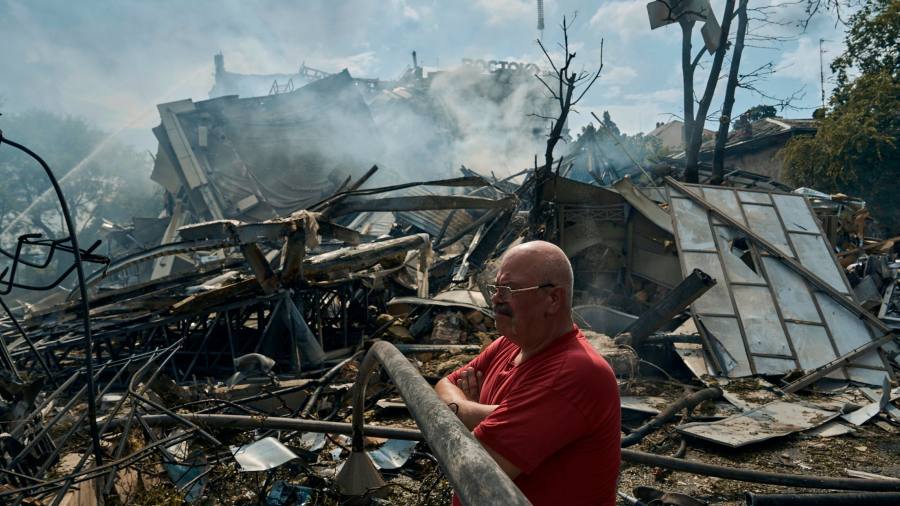Receive free War in Ukraine updates
We’ll send you a myFT Daily Digest email rounding up the latest War in Ukraine news every morning.
Russia has bombed Ukraine’s port cities for a third consecutive night after warning that it would treat grain ships as military targets, a threat the EU said demonstrated Moscow’s “barbarian attitude” as it attacks food supplies.
The strikes on the Black Sea port city of Odesa and nearby Mykolayiv early on Thursday killed at least two people while at least 23 were injured, Ukrainian authorities said.
The three nights of air strikes targeting Ukraine’s ports came after Moscow said on Monday that it would withdraw from an agreement that has allowed grain to be exported by ship to global markets.
Andriy Yermak, Ukrainian president Volodymyr Zelenskyy’s chief of staff, said they were “an attempt to destroy the ability to supply food to the countries of the global south”.
Moscow’s move to pull out from the Black Sea Grain Initiative, which since last August has allowed some 33mn tonnes of grain to be exported by sea, and its announcement that it would treat any inbound vessels as military threats, has driven up global food prices.
Wheat prices have risen 12 per cent in the last week, based on the US benchmark hard red winter wheat for September delivery.
“If this grain is not only stopped but [also] destroyed . . . this is going to create a huge food crisis in the world,” Josep Borrell, the EU’s foreign and defence chief, said on Thursday. “It is a very grave situation.”
Borrell said that 60,000 tonnes of grain had been burnt as a result of Russia bombing the storage facilities in Ukraine’s port infrastructure.
“This consideration that any ship [is considered as] a war ship and so a target for the military activities of Russia, is a step further in order to continue preventing Ukraine from exporting their grains,” he said ahead of a meeting of EU foreign ministers that will discuss the growing crisis.
He said the “massive air attacks” showed Russia’s “barbarian attitude which will be taken into consideration by the Council [of foreign ministers] today.”
“The ministers will have to discuss how to proceed, but there is only one solution: to increase the military support to Ukraine. If they are being bombed, we have to provide anti-aerial capacities,” he added.
Ukraine’s air force said that the attacks overnight on Wednesday and into Thursday “targeted ports, piers, residential buildings and trade networks” in the southern regions of the country.
Before the war, Ukraine accounted for around a tenth of global wheat exports. The latest air strikes indicate Russia will not shy away from directly attacking wheat-export infrastructure and stocks, according to analysts.
“Even if the [Black Sea Grain] deal were now to be renewed, it would not be as effective as it was before, due to the damage at the ports,” said Carlos Mera, agricultural analyst at Rabobank. While Ukraine does have alternative export routes for its grain, these involve significantly higher transportation costs.
In response to the Russian attacks, Annalena Baerbock, Germany’s foreign minister, said that work was under way to ensure grain would not rot in Ukraine as a result.
“Hundreds of thousands of people, not to say millions, urgently need the grain from Ukraine, which is why we are working with all our international partners so that the grain in Ukraine does not rot in silos in the next few weeks, but reaches the people of the world who urgently need it,” she said.
Read the full article here














